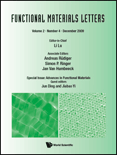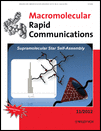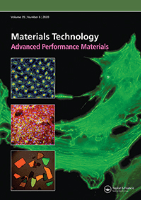
ACS Materials Au
metrics 2024
Pioneering the Future of Materials and Applications
Introduction
ACS Materials Au, published by the American Chemical Society, is a premier open-access journal that has been at the forefront of materials science since its inception in 2021. With an ISSN of 2694-2461, this journal encompasses an expansive range of topics including biomaterials, electronic, optical and magnetic materials, materials chemistry, and polymers and plastics, consistently achieving Q1 rankings in these categories for 2023. The journal is based in the United States and operates from the AMS's headquarters in Washington, DC, offering significant visibility and a robust platform for researchers. The journal's commitment to open access ensures wide dissemination of groundbreaking research, enabling a diverse audience—including researchers, professionals, and students—to engage with the latest advancements in materials science. With an encouraging impact factor and a focus on novel materials and innovative applications, ACS Materials Au stands as a vital resource for anyone devoted to understanding and advancing the frontiers of materials engineering and science.
Metrics 2024
 1.50
1.50 5.70
5.70 5.70
5.70 12
12Metrics History
Rank 2024
Scopus
IF (Web Of Science)
JCI (Web Of Science)
Quartile History
Similar Journals

ADVANCED FUNCTIONAL MATERIALS
Connecting Researchers to the Future of Materials ScienceADVANCED FUNCTIONAL MATERIALS is a leading journal published by WILEY-V C H VERLAG GMBH, prominently recognized in the fields of biomaterials, chemistry, condensed matter physics, and materials science. With an impressive impact factor and a distinguished position in the Q1 quartile across multiple categories including nanoscience and nanotechnology, this journal serves as a vital platform for researchers and professionals committed to innovating in functional materials. Since its inception in 2000, ADVANCED FUNCTIONAL MATERIALS has published high-quality peer-reviewed articles that push the boundaries of materials science, exploring new frontiers in electronic, optical, and magnetic materials. The journal's dedication to open access ensures that its groundbreaking findings are readily available to a global audience, fostering collaboration and knowledge-sharing among scholars and practitioners in the field. For those seeking to stay at the forefront of materials research, ADVANCED FUNCTIONAL MATERIALS is an essential resource.

MACROMOLECULAR RESEARCH
Pioneering Research in Polymer ApplicationsMACROMOLECULAR RESEARCH, published by the POLYMER SOC KOREA, is a premier journal dedicated to advancing the field of macromolecular science and polymer engineering. With its ISSN 1598-5032 and E-ISSN 2092-7673, this journal has emerged as a vital platform for researchers and professionals interested in the application and development of polymers across various domains. Based in South Korea and operating as an open-access resource since its inception in 2002, MACROMOLECULAR RESEARCH consistently ranks in the Q2 category across diverse fields such as Chemical Engineering, Materials Chemistry, and Organic Chemistry as per the latest 2023 metrics. Notably, it is recognized for its substantial contributions to polymery science, increasing its visibility and impact in global research. By providing a forum for original research articles, reviews, and innovative methodologies, this journal aims to foster collaboration and knowledge sharing among scientists, engineers, and students alike. Join a community that is at the forefront of polymer research by exploring the wealth of resources and cutting-edge studies featured in MACROMOLECULAR RESEARCH.

Functional Materials Letters
Highlighting transformative findings in functional materials.Functional Materials Letters, published by World Scientific Publishing Co. Pte Ltd, is an esteemed academic journal dedicated to disseminating cutting-edge research in the field of materials science. Since its inception in 2008, the journal has provided a vital platform for researchers, professionals, and students to share their discoveries pertaining to functional materials, which are integral for diverse applications ranging from electronics to advanced manufacturing. With an ISSN of 1793-6047 and an E-ISSN of 1793-7213, the journal operates out of Singapore and maintains a notable presence in the global academic community, currently ranked in the Q3 quartile for materials science. Although it does not offer open access, the journal ensures that its publications are rigorously peer-reviewed, contributing significantly to the advancement of knowledge in this rapidly evolving field. Researchers aiming to stay at the forefront of materials science will find Functional Materials Letters an indispensable resource that highlights innovative findings and fosters collaboration among scholars.

MRS Communications
Empowering researchers to share transformative materials knowledge.MRS Communications is a prominent academic journal published by Springer Heidelberg, focusing on the multidisciplinary field of materials science. With ISSN 2159-6859 and E-ISSN 2159-6867, this journal has been a valuable platform for disseminating cutting-edge research since its inception in 2011. Operating from its esteemed headquarters in Heidelberg, Germany, it aims to foster collaboration and innovation among researchers and practitioners by publishing high-quality, peer-reviewed articles. Holding a Q3 ranking in the Materials Science (Miscellaneous) category, and currently positioned at the 37th percentile in the general materials science field, MRS Communications is dedicated to advancing the understanding of materials through interdisciplinary studies. The journal offers researchers an opportunity to share insights that bridge theoretical knowledge with practical applications, contributing significantly to the global materials science community. As an essential resource for researchers, professionals, and students alike, we invite you to explore the latest advancements and discussions in materials science through this influential publication.

Materials Research Express
Delivering impactful insights in the realm of materials science.Materials Research Express is a leading open-access journal published by IOP Publishing Ltd, situated in the United Kingdom. Since its establishment in 2014, the journal has become an essential platform for researchers and professionals in the field of materials science, spanning several critical domains including biomaterials, metals and alloys, polymers, and electronic materials. With an open-access model adopted in 2020, Materials Research Express ensures that cutting-edge research is accessible to a global audience, enriching the dissemination of knowledge within the scientific community. The journal boasts impressive Scopus rankings, with a commendable position in various categories, such as 45th in Metals and Alloys and 51st in Surfaces, Coatings, and Films. This positions it well in the competitive landscape of materials science, fostering innovative discussions on material properties and applications. As the field continues to evolve, Materials Research Express aims to provide high-quality research and insights that address contemporary challenges and emerging technologies, making it an indispensable resource for academics and industry professionals alike.

Nano Express
Advancing nanotechnology for a transformative future.Nano Express is an esteemed open-access journal published by IOP Publishing Ltd, dedicated to advancing research in the fields of nanotechnology and materials science. Since its launch in 2020, the journal has swiftly established itself as a vital resource for researchers and professionals, garnering significant recognition in various domains, including biomaterials, electronic, optical and magnetic materials, and polymers and plastics. With a commendable categorization in Scopus quartiles, it ranks in Q2 for Electronic, Optical and Magnetic Materials, and maintains a top percentile in several others, exemplifying its commitment to high-quality research dissemination. Located in the United Kingdom, this journal fosters a global dialogue among experts and newcomers alike, facilitating open access to innovative research that drives the future of nanotechnology. By offering a platform for groundbreaking studies and reviews, Nano Express aims to bridge the gap between theoretical understanding and practical application, championing the development of next-generation materials that have the potential to transform various industries.

Materials Today Advances
Championing high-impact contributions in materials innovation.Materials Today Advances is a premier open access journal, published by Elsevier, dedicated to disseminating cutting-edge research in the fields of Materials Science and Mechanical Engineering. Since its inception in 2019, the journal has quickly established itself within the academic community, achieving an impressive Q1 quartile ranking in both disciplines as of 2023, indicative of its high-impact contributions. Ranked #25 out of 672 in Mechanical Engineering and #46 out of 463 in General Materials Science according to Scopus, Materials Today Advances offers rigorous peer-reviewed articles that address the latest innovations and interdisciplinary approaches. Researchers, professionals, and students can benefit from the journal's open access model, ensuring widespread visibility and accessibility of groundbreaking findings. With the convergence of advanced materials research and practical applications, this journal represents a vital resource for those at the forefront of scientific discovery.

MACROMOLECULAR RAPID COMMUNICATIONS
Driving the Future of Organic Chemistry ForwardMACROMOLECULAR RAPID COMMUNICATIONS, published by WILEY-V C H VERLAG GMBH in Germany, is an esteemed journal dedicated to the rapid dissemination of high-quality research in the fields of materials chemistry, organic chemistry, and polymers and plastics. With a remarkable 2023 impact factor securing its place in the prestigious Q1 category across three key disciplines, the journal ranks impressively within the top quartiles of the Scopus metrics, standing at 36th in organic chemistry and 35th in polymers and plastics. Although the journal does not offer open access options, its informative depth and innovative research make it an invaluable resource for researchers, professionals, and students seeking to stay abreast of the latest developments in macromolecular science. Covering a broad spectrum of topics from fundamental research to applications, MACROMOLECULAR RAPID COMMUNICATIONS aims to foster collaboration and inspire further advancements within the scientific community.

MATERIALS TECHNOLOGY
Transforming Ideas into Material SolutionsMATERIALS TECHNOLOGY is a prestigious academic journal published by Taylor & Francis Ltd, based in the United Kingdom. With an ISSN of 1066-7857 and an E-ISSN of 1753-5557, this journal has established itself as a vital resource in the fields of Condensed Matter Physics, Materials Science, Mechanical Engineering, and Mechanics of Materials, earning a Q2 ranking in multiple categories as of 2023. With a rich publication history that dates back to the early 1970s, it serves as an essential platform for disseminating innovative research and developments in materials technology. Although not available through Open Access, the journal continues to attract contributions from leading researchers, ensuring high-quality articles that advance knowledge in the materials domain. The journal's commitment to excellence is reflected in its notable Scopus rankings, placing it within the 70th to 78th percentiles across several engineering and physics categories. As a vital resource for researchers, professionals, and students alike, MATERIALS TECHNOLOGY plays a critical role in shaping the future of materials science and engineering.

Journal of Materials Chemistry B
Fostering Collaboration in Cutting-edge Materials Research.Journal of Materials Chemistry B is a prestigious peer-reviewed journal published by the Royal Society of Chemistry, specializing in the latest advancements in the realm of materials chemistry. With a profound impact in the scientific community, this journal has achieved impressive Q1 quartile rankings in 2023 across several categories, including Biomedical Engineering, Miscellaneous Chemistry, Materials Science, and Medicine, illustrating its pivotal role in interdisciplinary research. Its impressive Scopus rankings further emphasize its widespread recognition, with notable placements in the top percentiles for various fields. Covering a broad scope of topics from novel materials for biomedical applications to innovative chemical synthesis techniques, the journal aims to promote knowledge exchange and foster collaborative research across disciplines. Although not an open-access journal, it offers a platform for researchers to share their findings and contribute to the evolving discourse within materials science. With a publication record spanning from 2013 to 2024, the Journal of Materials Chemistry B remains an essential resource for researchers, professionals, and students dedicated to exploring the frontiers of materials chemistry.